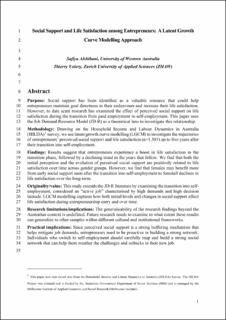Please use this identifier to cite or link to this item:
https://doi.org/10.21256/zhaw-20690Full metadata record
| DC Field | Value | Language |
|---|---|---|
| dc.contributor.author | Alshibani, Safiya Mukhtar | - |
| dc.contributor.author | Volery, Thierry | - |
| dc.date.accessioned | 2020-10-22T11:43:34Z | - |
| dc.date.available | 2020-10-22T11:43:34Z | - |
| dc.date.issued | 2020-09-15 | - |
| dc.identifier.issn | 0143-7720 | de_CH |
| dc.identifier.issn | 1758-6577 | de_CH |
| dc.identifier.uri | https://digitalcollection.zhaw.ch/handle/11475/20690 | - |
| dc.description.abstract | Purpose: Social support has been identified as a valuable resource that could help entrepreneurs maintain goal directness in their endeavours and increase their life satisfaction. However, to date, scant research has examined the effect of perceived social support on life satisfaction during the transition from paid employment to self-employment. This paper uses the job demand resource model (JD–R) as a theoretical lens to investigate this relationship. Design/methodology/approach: Drawing on the household income and labour dynamics in Australia (HILDA) survey, we use latent growth curve modelling (LGCM) to investigate the trajectories of entrepreneurs' perceived social support and life satisfaction (n = 1,303) up to five years after their transition into self-employment. Findings: Results suggest that entrepreneurs experience a boost in life satisfaction in the transition phase, followed by a declining trend in the years that follow. We find that both the initial perception and the evolution of perceived social support are positively related to life satisfaction over time across gender groups. However, we find that females may benefit more from early social support soon after the transition into self-employment to forestall declines in life satisfaction over the long-term. Research limitations/implications: The generalisability of the research findings beyond the Australian context is undefined. Future research needs to examine to what extent these results can generalize to other samples within different cultural and institutional frameworks. Practical implications: Since perceived social support is a strong buffering mechanism that helps mitigate job demands, entrepreneurs need to be proactive in building a strong network. Individuals who switch to self-employment should carefully map and build a strong social network that can help them weather the challenges and setbacks in their new job. Originality/value: This study extends the JD–R literature by examining the transition into self-employment, considered an “active job” characterised by high demands and high decision latitude. LGCM modelling captures how both initial levels and changes in social support affect life satisfaction during entrepreneurship entry and over time. | de_CH |
| dc.language.iso | en | de_CH |
| dc.publisher | Emerald | de_CH |
| dc.relation.ispartof | International Journal of Manpower | de_CH |
| dc.rights | Licence according to publishing contract | de_CH |
| dc.subject | Entrepreneurial entry | de_CH |
| dc.subject | Gender analysis | de_CH |
| dc.subject | HILDA | de_CH |
| dc.subject | Life satisfaction | de_CH |
| dc.subject.ddc | 658.4: Leitendes Management | de_CH |
| dc.title | Social support and life satisfaction among entrepreneurs : a latent growth curve modelling approach | de_CH |
| dc.type | Beitrag in wissenschaftlicher Zeitschrift | de_CH |
| dcterms.type | Text | de_CH |
| zhaw.departement | School of Management and Law | de_CH |
| dc.identifier.doi | 10.1108/IJM-02-2019-0107 | de_CH |
| dc.identifier.doi | 10.21256/zhaw-20690 | - |
| zhaw.funding.eu | No | de_CH |
| zhaw.issue | 2 | de_CH |
| zhaw.originated.zhaw | Yes | de_CH |
| zhaw.publication.status | acceptedVersion | de_CH |
| zhaw.volume | 42 | de_CH |
| zhaw.publication.review | Peer review (Publikation) | de_CH |
| zhaw.webfeed | W: Spitzenpublikation | de_CH |
| zhaw.author.additional | No | de_CH |
| zhaw.display.portrait | Yes | de_CH |
| Appears in collections: | Publikationen School of Management and Law | |
Files in This Item:
| File | Description | Size | Format | |
|---|---|---|---|---|
| 2020_Alshibani-Volery_Social-Support-and-Life-Satisfaction-among-Entrepreneurs.pdf | Accepted Version | 1.12 MB | Adobe PDF |  View/Open |
Show simple item record
Alshibani, S. M., & Volery, T. (2020). Social support and life satisfaction among entrepreneurs : a latent growth curve modelling approach. International Journal of Manpower, 42(2). https://doi.org/10.1108/IJM-02-2019-0107
Alshibani, S.M. and Volery, T. (2020) ‘Social support and life satisfaction among entrepreneurs : a latent growth curve modelling approach’, International Journal of Manpower, 42(2). Available at: https://doi.org/10.1108/IJM-02-2019-0107.
S. M. Alshibani and T. Volery, “Social support and life satisfaction among entrepreneurs : a latent growth curve modelling approach,” International Journal of Manpower, vol. 42, no. 2, Sep. 2020, doi: 10.1108/IJM-02-2019-0107.
ALSHIBANI, Safiya Mukhtar und Thierry VOLERY, 2020. Social support and life satisfaction among entrepreneurs : a latent growth curve modelling approach. International Journal of Manpower. 15 September 2020. Bd. 42, Nr. 2. DOI 10.1108/IJM-02-2019-0107
Alshibani, Safiya Mukhtar, and Thierry Volery. 2020. “Social Support and Life Satisfaction among Entrepreneurs : A Latent Growth Curve Modelling Approach.” International Journal of Manpower 42 (2). https://doi.org/10.1108/IJM-02-2019-0107.
Alshibani, Safiya Mukhtar, and Thierry Volery. “Social Support and Life Satisfaction among Entrepreneurs : A Latent Growth Curve Modelling Approach.” International Journal of Manpower, vol. 42, no. 2, Sept. 2020, https://doi.org/10.1108/IJM-02-2019-0107.
Items in DSpace are protected by copyright, with all rights reserved, unless otherwise indicated.